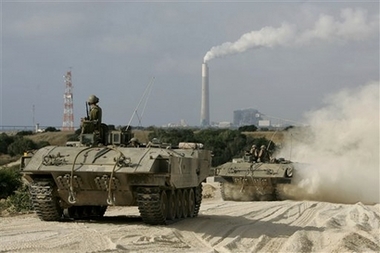Israel: No quick fix for rocket threat
(AP)Updated: 2007-05-28 09:34
JERUSALEM - Prime Minister Ehud Olmert said Sunday he authorized the army to do whatever it takes to halt Palestinian rocket fire - even as an Israeli was killed by a salvo from Gaza - but warned his Cabinet there was no quick solution.
 Israeli armored vehicles drive towards the northern Gaza Strip from Israel, Sunday, May 27, 2007. [AP]  |
A rocket slammed into the town of Sderot - one of nine the Israeli army said struck the area on Sunday - killing a 36-year-old computer technician as he was driving. It was the second time in a week a Palestinian rocket has killed an Israeli there.
Israeli aircraft on Sunday night hit what the military said were Hamas facilities to the north and south of Gaza City. Palestinian officials said there were no reports of casualties.
"We need to be prepared for dealing with this in the long term," Olmert warned his Cabinet. He said Israel's campaign against the attacks would not be time-limited, nor would the country yield to outside pressure.
"There will be no limit in acting against the terror groups and against those who are responsible for the terror. No one is immune," Olmert said.
In the private Cabinet session, Olmert seemed cool to efforts by Egypt and moderate Palestinian President Mahmoud Abbas to negotiate a new cease-fire, according to a participant who spoke on condition of anonymity according to civil service rules.
Olmert acknowledged there is no immediate military answer to the crude Qassam rockets, which have long baffled Israel's high-tech army. "We don't want to create unrealistic expectations that it's possible to stop the Qassams totally," he said.
The participant in the Cabinet session said the ministers did not discuss targeting Hamas' political leaders or launching a large-scale ground operation in Gaza.
Israeli airstrikes appear to have hit Hamas hard - knocking out key bases, killing several top militants and forcing the movement's leadership underground. Israel has so far avoided attacks on Hamas leaders - a tactic it used in the past. Hamas is now the senior partner in the Palestinian coalition government.
Israeli missiles have hit near the homes of Prime Minister Ismail Haniyeh and lawmaker Khalil al-Haya, both of Hamas, but the army has said the men were not targets.
Olmert spokeswoman Miri Eisin would not say if Hamas' top political leaders were now targets, but said Israel would strike those involved in the attacks as well as anyone who smuggles weapons or money used for the attacks.
"If their leadership is directly involved in terror, their leadership is not immune," she said.
Sami Abu Zuhri, a Hamas spokesman, warned Israel not to target the movement's leaders. "Whoever thinks that harming the Hamas leadership can dissipate the movement is a fool," he said.
Sunday's rocket attack came a day after Hamas vowed revenge for Israeli airstrikes that killed five militants in Gaza. Hamas also warned the air assault would jeopardize the release of Cpl. Gilad Shalit, the Israeli soldier captured last June by Hamas-linked militants.
Jordan's King Abdullah II told a visiting U.S. congressional delegation on Sunday that Capitol Hill has a crucial role in advancing Israeli-Palestinian peacemaking.
He warned that failure to end Israel's occupation of the West Bank and help create an independent Palestinian state would "undermine efforts to address other issues in the region" - a clear reference to violence in Iraq and Iran's nuclear program.
The Israeli-Palestinian violence comes as Israel's Labor Party is to hold its leadership race Monday. The outcome could impact the stability of Olmert's government and the embattled prime minister's future.
The centrist party is the largest of three junior partners in the ruling coalition with Olmert's Kadima Party. But both front-runners in Monday's race have said they will work to topple the prime minister.
|
||
|
||
|
|